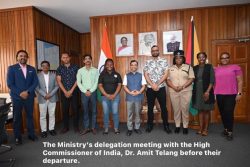Dear Editor,
Late last year emerging from an official visit to Cuba, was an announcement of the intention to engage assistance of Cuban expertise for Guyana’s sugar industry. It has been previously noted that this was the second initiation of the kind in recent years.
It has also been previously noted that in addition to the Chinese mercurial Skeldon project, there have been subsequent injections (if not invasions) of English, South African, and of course Indian personnel (not necessarily expertise). The latter (and South African) are still recognised on more than one estate.
Now it would appear they are to be reinforced, that is if one is to believe the latest announcement coming out of the very recent official trip to India.
At the same time there are those of us local connoisseurs of the sugar industry who are insistently ignored, and whose high-level experience in all aspects of the industry remains unappreciated. There is this obsession with overseas prospective talents too large a disproportion of whom have disappointed expectations, except possibly as tourists.
Intricated in this mélange of multicultural expertise would appear to be the quality of advice being sought and given for engaging the right type of technical assistance for the various components of the sugar industry. It is true that India has perhaps one of the most reputable sugar production entities in the world. If they are to be helpful, GuySuCo must be absolutely clear in its mind about the specific areas of weaknesses it needs to be addressed; and for the sustainable future of those strengths for which the substantive development of comparable local human resources is needed. So that there must be a substantive element of training and development – a contribution which incidentally can also be made by local experts, in plain English.
But since there already has been established a disposition towards multiculturalism, a strong case can be made for the acknowledged productivity and technical competence of the neighbouring Brazilian sugar industry to provide significant support.
The reasoning therefore seems to flow in the direction of arranging for a confluence of analyses by all relevant parties, of the strengths and weaknesses of the Guyana sugar industry; a realistic evaluation of its sustainability; the financial and social advantages of diversification; and the possible reconstruction of the existing configuration.
What obtains now is an incestuous mental environment, in which the afflicted do not apprehend the nature of the affliction with which they grapple.
From this cautious perspective it is not enough to react to the technologies only, as if they are not operated, coordinated, supervised and managed by people – an organisational requirement that again available local talent successfully met even in the early days of GuySuCo.
The latter apart, attentive stakeholders would have noted the under-achievement of GuySuCo’s several ‘Turnaround Plans’, possibly not recognising the underlying implication of their not necessarily moving forward. At this stage therefore it is certainly not too exotic an idea to convince the aforementioned multicultural task force to embark on a deliberate evaluation of our industry, and to prepare a comprehensive plan for implementation, alongside some realistic recommendations for alternative redevelopment. This is the sort of assistance we must insist on.
One thing must be clear however – that these exercises must preclude all political interventions, too many of which now pervade the decision-making process in which timid managers participate.
Recommendations for interpreters are now welcome.
Yours faithfully,
E B John







